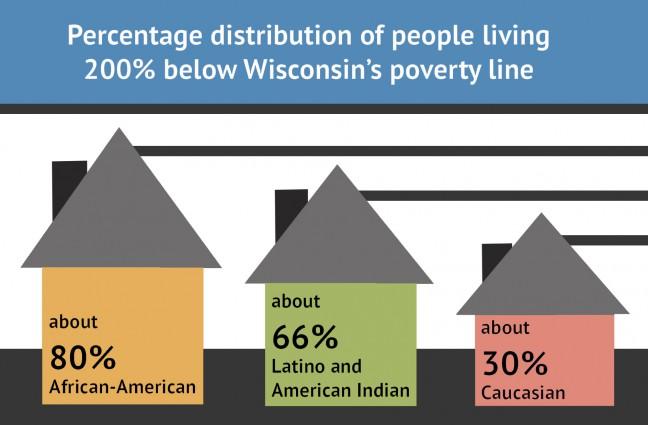Community leaders in Madison are planning solutions for continuing and correlated issues of racial disparities and poverty of young families.
University of Wisconsin Chancellor Rebecca Blank will co-chair a delegation led by United Way of Dane County to better understand poverty in the Madison area and offer solutions to diminish it, specifically among young families.
The delegation, which had its first meeting last week, will continue to meet for the next 11 months, breaking this time into three distinct phases in which to study, compare and solve problems of economic stability in Madison, according to the United Way website.
The 40 members of the delegation consist of community leaders in business, government, higher education, health services, communities of color, faith-based organizations and social service organizations, the website said.
“The role of United Way is to get everybody on the same page at the community level. They inform and educate, and a big part of what we do is bring awareness to issues and solutions. A big job of United Way is to also create a community will for change,” Renee Moe, executive vice president of resource development and marketing at United Way of Dane County, said.
Poverty, especially among single women and children, is a growing problem in the community, especially since the Great Recession of 2008-2009, Moe said.
“In the 70’s we used to see more single men [in poverty], and now we’re seeing more single families with children. From a generational perspective, this needs to be addressed,” Moe said.
Statistics on poverty show that there is a lot of work to do to improve the lives of struggling individuals and families in the community. Poverty has increased 51 percent since 2000, and women are more likely to be living in poverty than men, the website said.
In 2012 there were 58,533 people in Dane County living in poverty, amounting to about one in eight residents and nearly one in six children. In 2012 the federal poverty level was set at or below $23,550 for a family of four.
36 percent of African American women are living below the poverty line, while 49 percent of African American children are in Dane County, the website said. Seven percent of Dane County children lived with families under the extreme poverty level.
Blank noted the importance of addressing poverty in the area.
“Particularly for African Americans, Hispanics, and single mother families, poverty rates are up near 25 percent to one third, and almost half of the children in those families are poor,” Blank said. “There is a significant part of our community that is indeed [in poverty] on a regular basis. It’s out of that concern that the United Way decided to put this delegation together.”
The delegation has convened once so far, but it is confident the solutions it recommends to the United Way will begin to address the root causes of poverty, Blank said.
“The university is involved in a number of important ways with the community, whether it is Badger Volunteers or some of our joint work with the school districts, and I think it is very important for the university, given the role it plays in this community, to be actively involved in these sorts of conversations,” Blank said.
Last week the Madison Common Council also adopted a resolution stating a “commitment to equity in policing and providing opportunities to everyone to succeed,” Ald. Scott Resnick, District 8, said.
Resnick said the city is making a push for more equitable practices through programs like the 2015 affordable housing fund and a study looking to address the “digital divide,” which Resnick has been a leading proponent of.
However, Resnick said the city still has work to do. There is a massive amount of room for improvement, he said, and Madison has a long way to go before all students and residents in the city have the same opportunities.
“I believe that we’re all going to need to work together to make a dent,” Resnick said. “This is a historical problem for Madison, this is not something that occurred over night, and it will not be changed overnight. But I believe by working together we’re going to be able to address the divide in our equity gap, our employment gap and our achievement gap.”
Pamela Oliver, professor in sociology at UW, said the conversation to end racial disparities in Madison has been a long one.
“People have cared about this issue for a very long time, at least ten years, maybe longer,” Oliver said. “The Race to Equity report that came out last year sparked a bunch of discussion and there was also the Justified Anger essay and coalition, so there has been a lot of energy that has focused on the whole picture.”
Oliver said criminal justice issues are part of the educational problems and part of the economic inequality and job discrimination problems in the city.
“Arrest disparities are extremely high here,” Oliver said. “Law enforcement works when police are viewed as helping to protect the public order. Everything starts to fall apart if the police are viewed as the enemy.”
Oliver said a characteristic that might lead to the disparity in the incarceration rates might have to do with the higher focus on minor crimes due to the general safety of the city.













